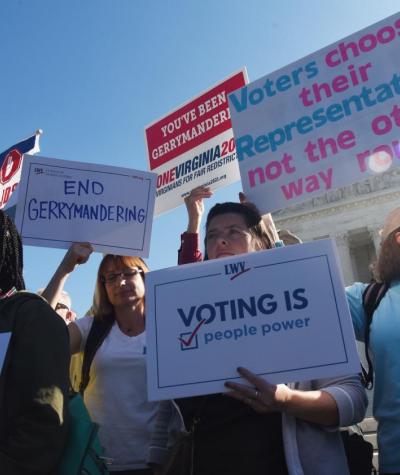This month the Supreme Court of the United States is set to issue an opinion in a case I’ve been working on for many years: Gill v. Whitford. I, along with a team, represent Bill Whitford and his fellow plaintiffs in seeking to strike down the Wisconsin state house plan as a partisan gerrymander, in violation of the First and Fourteenth Amendments to the Constitution.
In its decision, the Court may approve a constitutional standard that will prevent partisan gerrymandering, not just in Wisconsin, but across the whole country. In anticipation of the decision, many commentators are trying to grapple with its possible magnitude. David Brooks of the New York Times, suggests that reforms to gerrymandering “would have only a marginal effect on our politics;” and Jonathan S. Tobin of the National Review writes that “Democrats have high expectations about the impact of a victory for the plaintiffs in these cases. But the truth about their electoral woes has less to do with Republican skullduggery than the Voting Rights Act.”
Both commentators make some good points (Brooks supports ranked choice voting with multi-member districts to reduce partisan polarization, and Tobin explains that “[b]oth parties have always treated the process of drawing congressional districts…as an opportunity to increase their odds of winning while harming their opponents’ chances”), but there are nuances in their opinions that are worthy of further discussion.
Brooks claim as to the small effect of partisan gerrymandering is well made only with respect to his argument that partisan gerrymandering will likely not reduce partisan polarization. That has been well-established by political scientists like Nolan McCarty, Keith Poole, and Howard Rosenthal. What Brooks overlooks however, is that political polarization is only one harm facing our democracy.
The harm that partisan gerrymandering creates is the misalignment between what voters want and what their legislatures and congressional delegations deliver. In this decade alone we have seen multiple wrong-winner outcomes (48.6% of people voted for Republican state house candidates in Wisconsin in 2012, yet Republicans constituted 60% of the legislature after 2012). And it’s not just in purple states where this is a problem. Rhode Island is overwhelmingly Democratic, yet in 2013, when Republicans and moderate Democrats opposed raising the state’s gas tax, the gerrymandered legislature ignored their wishes and hiked up the tax anyway. This misalignment between voters and their supposed representatives is something that the Whitford case is poised to reduce, or hopefully end altogether.
Tobin, too, establishes a straw man. Whether compliance with the Voting Rights Act (VRA) means one cannot draw a redistricting plan that is fair to both Democratic and Republican voters is an empirical question, and one to which we have answers. Two political scientists, Kenneth Mayer and Jowei Chen, have shown that it is possible to draw hundreds of redistricting plans for the Wisconsin state legislature that both comply with the VRA and treat the voters of each party roughly equally. Dr. Chen found a similar result when he analyzed possible plans in the North Carolina and Pennsylvania congressional contexts.
Commentators are right that if the Whitford plaintiffs are victorious this month it will not immediately fix all our political woes. That’s why at Campaign Legal Center we focus on so many issues of democratic dysfunction: money in politics, ethics reform, promoting voting rights, as well as improving our redistricting systems. Though ending partisan gerrymandering may not be sufficient to solve all our political troubles, it is a necessary step in that direction, and for that reason, I think it’s a very big deal.
